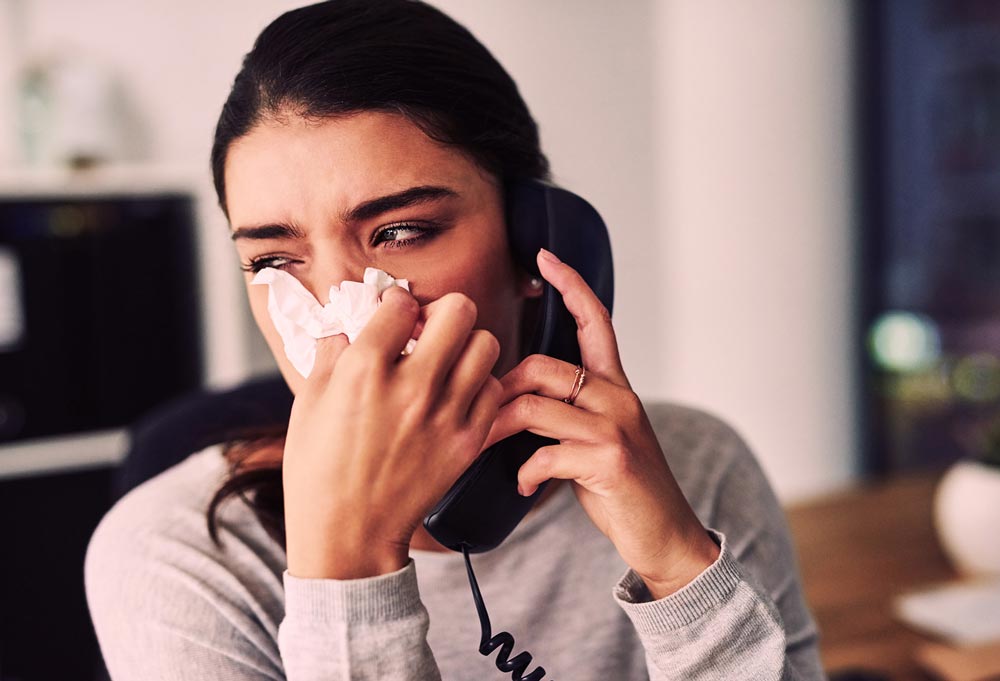If you’re dealing with a stuffy, plugged-up nose that just doesn’t seem to get better, you may need a decongestant. These medications are different from typical allergy medications like antihistamines. Instead, decongestants are used to help reduce swelling in the nose and sinuses, letting you breathe easier.
In this article, we’ll discuss what decongestants are, how they work, and answer questions you may have about taking them.
What Is a Decongestant?
So, what are decongestants? These medications help treat congestion caused by allergies, colds, asthma, and other irritants.1 Commonly used decongestants include pseudoephedrine (sold under the brand name Sudafed), phenylephrine (sold under the brand name Sudafed PE), and oxymetazoline (sold under the brand name Afrin).2
There are several types of decongestants, including:3
Pills or capsules
Drops
Nasal sprays
Syrups or liquids
Flavored powders that are dissolved in warm water
Some decongestants are also combined with pain relievers or antihistamines to help alleviate congestion while treating other conditions.
How Do Decongestants Work?
Congestion is caused by inflammation and irritation to tissues in the nose and sinuses. During an allergic reaction, histamine is released in the nose (and throughout the body), which causes the blood vessels in your nose to expand or become filled with fluid. This leads to that stuffy, plugged-up feeling you may experience with allergies.
Decongestants work by constricting the blood vessels in your nose, which helps reduce swelling and drain fluid. As the swelling goes down, your nasal passages widen, helping you breathe easier.1,4
Is BENADRYL® a Decongestant?
Benadryl offers a range of products and some of them help treat congestion. Diphenhydramine is the antihistamine in Benadryl that works by blocking the effects of histamine in the body.
Our product offering includes BENADRYL® Allergy Plus Congestion that combines the power of diphenhydramine with the decongestant phenylephrine to help treat allergy symptoms, plus sinus pressure and congestion.
Children tend to be more sensitive to congestion, especially when they’re trying to sleep.1 To help them sleep better at night with a stuffy nose, try Children’s BENADRYL® Allergy Plus Congestion.
What Symptoms Do Decongestants Relieve?
So, does BENADRYL® help congestion? Yes, some products do! BENADRYL® Allergy Plus Congestion can provide effective relief from symptoms caused by upper respiratory allergies or hay fever, or the common cold. These include:
Runny nose
Sneezing
Itchy throat
Itchy, watery eyes
Sinus congestion
Sinus pressure
Do Decongestants Help With Allergies?
In some cases, allergies can cause a condition known as allergic sinusitis. This is caused by histamine release, leading to inflammation of the tissues that line the nose and sinuses. As a result, you may experience congestion and sinus pressure for an extended period of time, along with typical allergy symptoms.6
While decongestants do not directly treat allergic sinusitis or allergies in general, they can help treat the associated symptoms. This is because decongestants do not block histamine, but they can reduce swelling to treat stuffy noses and sinus pressure. BENADRYL® combines the allergy-fighting power of antihistamines and decongestants to provide extra relief.
BENADRYL® for Congestion Caused by Allergies
If you have a stuffy, plugged nose caused by allergies, BENADRYL® Allergy Plus Congestion products can help. These medications target both the histamine responsible for allergy symptoms along with the resulting congestion for ultimate relief. For kids 6 years or older, use Children’s BENADRYL® Allergy Plus Congestion.
References
Mayo Clinic. Nasal congestion. February 27, 2021. Accessed from: https://www.mayoclinic.org/symptoms/nasal-congestion/basics/causes/sym-20050644
HealthLink BC. Decongestants. September 15, 2021. Accessed from: https://www.healthlinkbc.ca/health-topics/decongestants
National Health Services. Decongestants. February 28, 2022. Accessed from: https://www.nhs.uk/conditions/decongestants/
Harvard Health Publishing. Don’t let decongestants squeeze your heart. June 21, 2021. Accessed from: https://www.health.harvard.edu/heart-health/dont-let-decongestants-squeeze-your-heart
American College of Allergy, Asthma, & Immunology. Allergy Symptoms. Accessed from: https://acaai.org/allergies/symptoms/
Cedars Sinai. Allergic Sinusitis. Accessed from: https://www.cedars-sinai.org/health-library/diseases-and-conditions/a/allergic-sinusitis.html
UT Southwestern Medical Center. Which over-the-counter cold medications are safe during pregnancy? January 9, 2018. Accessed from: https://utswmed.org/medblog/otc-cold-medication-safe-pregnancy/
Mayo Clinic. Breast-feeding and medications: What’s safe? February 25, 2022. Accessed from: https://www.mayoclinic.org/healthy-lifestyle/infant-and-toddler-health/in-depth/breastfeeding-and-medications/art-20043975
Mayo Clinic. Antihistamine/Decongestant Combination (Oral Route). May 1, 2022. Accessed from: https://www.mayoclinic.org/drugs-supplements/antihistamine-decongestant-combination-oral-route/proper-use/drg-20069883?p=1


